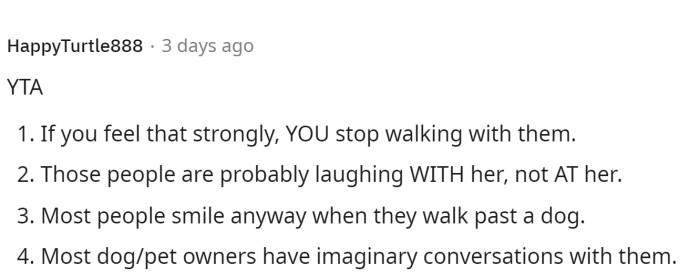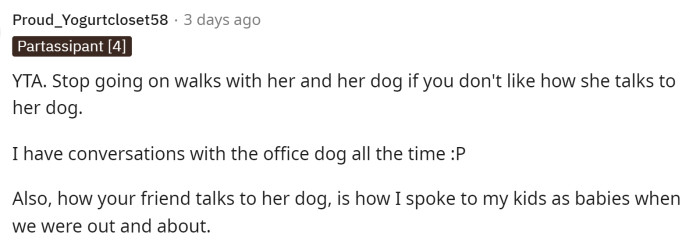Girl Leaves Friend At The Park Because She's Embarrassed By The Way She Talks To Her Dog In Public
Welcome back to another Reddit post submitted on the AITA thread. This thread is the perfect way for people to get unbiased opinions and advice on situations they are part of.
Usually, we enjoy covering these posts because they are quite entertaining, and they often receive a lot of feedback, which makes them even more fun to read. With that said, we are here to cover another one today, as this particular post had people quite heated in the comments.
So, with all this in mind, we are here again to discuss a situation where a girl posted on Reddit to see if she was wrong for leaving her friend in public, claiming that her friend was embarrassing her. Ultimately, people were upset with her, but she didn't do the worst thing she could have done.
This is why commenters were full of opinions, as they felt that OP overreacted. However, let's see what you all think about it once we delve into the full story and the comments left below.
If this sounds interesting to you, then keep reading as we dive into this full post and the comments on it as well.
OP starts off by saying that she has a friend with a dog and explains a bit about the dog's behavior and why it's an issue for her.

She explains the actual situation that occurred, which made her leave: her friend began talking to her dog.

This is how the conversation went between her friend and her friend's dog, which made her feel super uncomfortable and embarrassed.

Embarrassment and Social Norms
Embarrassment in social situations often stems from the desire to conform to social norms and expectations. This scenario highlights how peer perceptions can influence behavior, especially among adolescents. Research indicates that feelings of embarrassment can trigger anxiety and impact one's willingness to engage in certain behaviors, such as talking to pets in public.
Studies published in the Journal of Social Psychology suggest that social approval plays a significant role in shaping behaviors, particularly during formative years.
She mentioned that people were walking by and laughing at them, so she decided to leave since it was embarrassing her so much.

Many people criticized her, telling her she was the TA and that she was being a bit too dramatic about something very innocent.

These comments quickly put OP in her place, letting her know that she has no right to tell her friend not to talk to her dog however she wants.

Furthermore, individuals often fear judgment from peers, which can lead to self-consciousness and avoidance of behaviors that are viewed as socially unacceptable. A clinical psychologist notes that understanding the roots of embarrassment can help individuals develop healthier coping mechanisms when navigating social situations. This insight emphasizes the importance of self-acceptance and self-compassion.
People really thought this was the perfect situation to make jokes because clearly OP was just being a little upset over something that didn't quite matter.

This person provided several reasons as to why OP was the TA, in case others didn't quite understand based on the other comments.

Ultimately, OP didn't have to tag along, and she could simply avoid going on walks with her friend and the dog if it was that big of a problem.

Cultivating Self-Acceptance
Building self-acceptance is crucial for navigating feelings of embarrassment. Research indicates that individuals who practice self-compassion are less likely to be affected by social anxiety. Techniques such as self-reflection and mindfulness can help individuals cultivate a healthier relationship with themselves and their behaviors, reducing the fear of judgment.
Encouraging open conversations about feelings can also help individuals feel more accepted and supported in their social interactions.
People truly felt that OP was the TA in this situation because she was being quite rude to a friend who was just enjoying some time with her dog. With all the votes for TA, we hope that OP starts to develop a sense of humor or at least takes action and doesn't accompany her friend on walks anymore.
Really though, it wasn't that serious of a situation for her to be that embarrassed.
Additionally, surrounding oneself with supportive friends can mitigate feelings of embarrassment. Studies show that positive social connections can bolster confidence and reduce anxiety in social situations. It's essential to foster environments where individuals feel safe to express themselves without fear of ridicule.
Psychological Analysis
This scenario reflects the universal struggle with embarrassment, particularly in social settings. It’s important to recognize that feelings of self-consciousness are common and can significantly affect how individuals present themselves, especially during adolescence.
Analysis generated by AI
Analysis & Alternative Approaches
Ultimately, understanding the dynamics of embarrassment and social norms is essential for fostering self-acceptance among individuals. Research supports that cultivating self-compassion and surrounding oneself with supportive peers can enhance emotional well-being. By encouraging open dialogues about feelings, individuals can navigate social situations more confidently.



